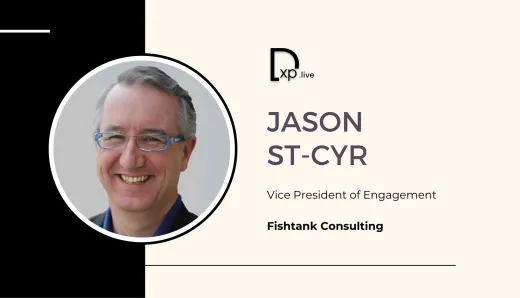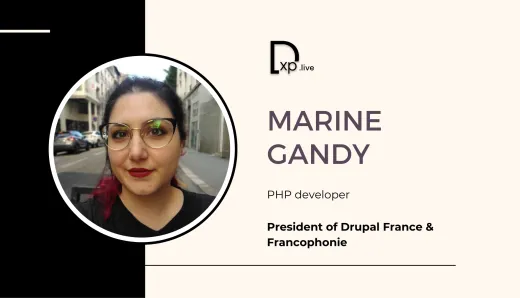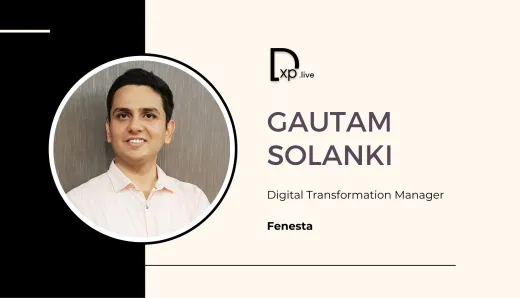Empowering Change in Drupal: From Learner to Leader
Insights on Drupal’s evolution and the power of community from Aastha Shrivastava
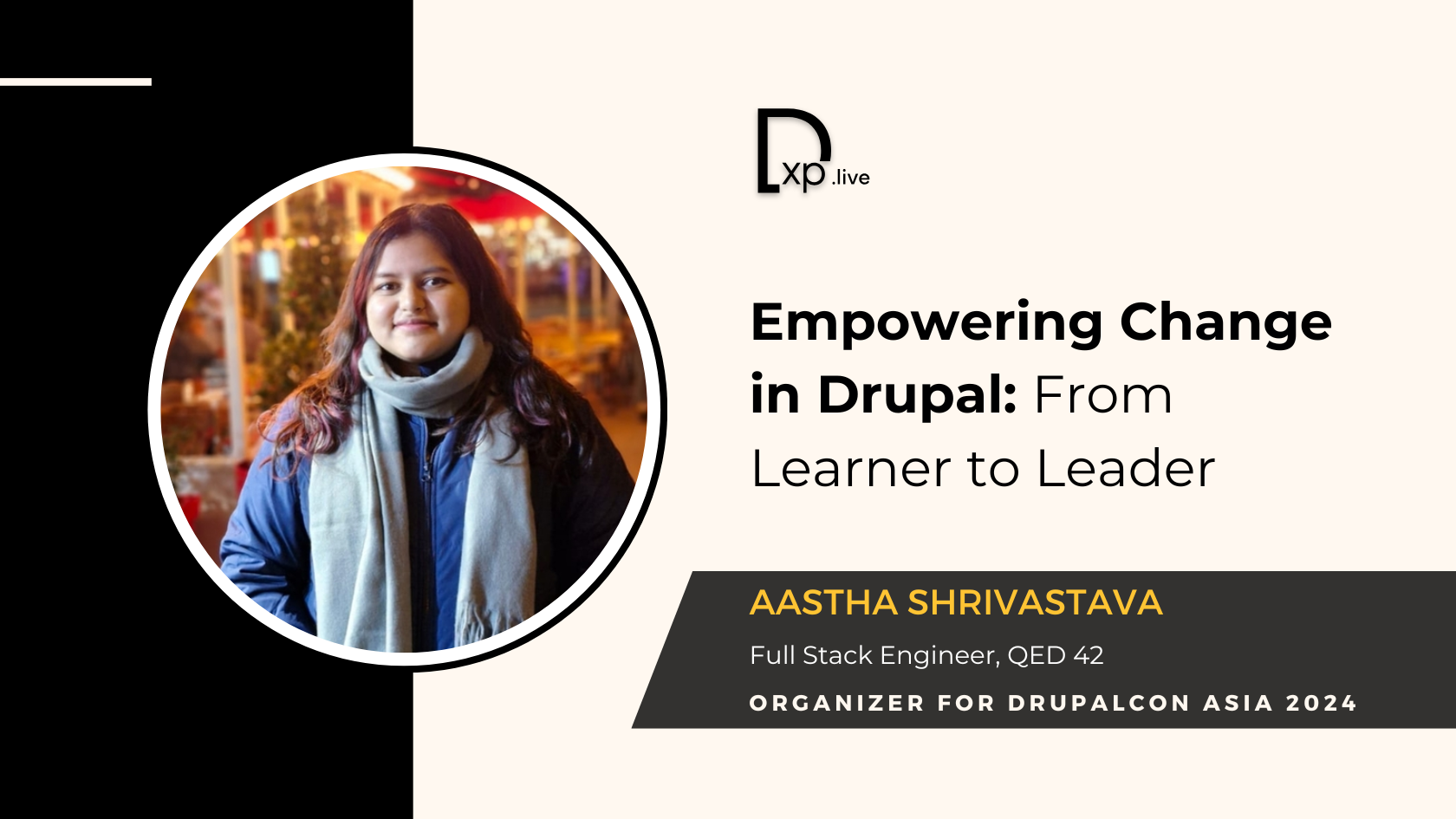
Aastha Shrivastava is a Full Stack Engineer at QED42 and an influential leader in the Drupal community. With over four years of expertise in engineering and open-source advocacy, she is a GSoC 2024 Mentor with the Drupal Association and a committee member for the upcoming DrupalCon Asia 2024 in Singapore. Her work emphasizes community empowerment, and her efforts to make Drupal accessible and inclusive reflect her commitment to fostering knowledge-sharing and growth. With hands-on experience from events like DrupalCon Europe, Aastha is a driving force in bringing Drupal’s vision to the Asia region and beyond, empowering the next generation of developers and contributors, also, championing open-source collaboration and community-driven growth.
Introduction
In this interview, we dive into Aastha Shrivastava’s remarkable journey within the Drupal community, where she has become a passionate advocate for collaboration, accessibility, and knowledge-sharing. As a key committee member and organizer for the highly anticipated DrupalCon Asia 2024, Aastha is instrumental in bringing this global event back to the Asia region, energizing the community and spotlighting the innovation happening within Drupal. Her work extends beyond technical contributions, as she champions initiatives that encourage new contributors and build a more inclusive, diverse space for open-source technology. Through her insights, Aastha shares the unique elements that set Drupal apart and offers a glimpse into the community-driven future she envisions for the platform.
Your journey with Drupal has been long and impactful. Can you share what initially drew you to Drupal and how your experience has evolved over the years?
Aastha: I was introduced to Drupal during college through a course, as my college(SICSR) focused heavily on open-source technology. In 2017, DrupalCamp Pune was held at my college, and I volunteered there. That’s when I got a glimpse of the Drupal community and met the people I now work with. Initially, as a student, Drupal felt overwhelming since it’s such a vast platform. There was so much to learn to work with it effectively, which was intimidating back then.
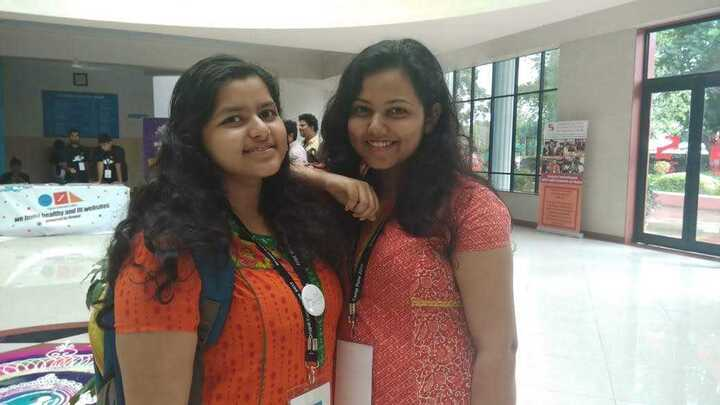
After graduating, I joined QED42 as an intern, where I finally learned Drupal hands-on, from module development to core development. That’s when I truly began to appreciate Drupal’s flexibility and versatility, and I started enjoying working with it. During the pandemic, I got to know about monthly contribution sprints organized by the Drupal India Association from my mentors, Hemant Gupta and Jaideep Kandari, at QED42, where I made my first contribution, a small documentation edit, and earned my first community credit. That first step was significant for me, and I connected with mentors who encouraged me to dive deeper into the community. One mentor, Surabhi Gokte, constantly pushed me to get involved in events like DrupalCon and various camps. She’s been a big part of my journey, and through her, I’ve met many others who are now close friends.
I was lucky enough to have the support of my organization QED42 and leaders like Piyuesh Kumar who not only let me spend time contributing and collaborating with the local community but also made it possible for me to attend global events like Drupal Dev Days Vienna and DrupalCon Lille, which opened up a plethora of new opportunities for me.
Looking back, I never imagined I’d be in the position I am today. I started as a volunteer at DrupalCamp for just a day, and now I’m organizing the same event. It’s been a rewarding journey, and it keeps getting better.
DrupalCamp Pune 2024 saw significant success under your leadership. What were some key takeaways from organizing that event, and how do you plan to carry those insights into future Drupal events?
Aastha: This year’s DrupalCamp Pune 2024 was unique, as it was our first paid camp, and despite some initial skepticism, it drew a great turnout. My biggest takeaway is that if you offer quality sessions and valuable content, people will attend, whether it’s a free or paid event. Attendees ranged from new Drupal users to those with a decade of experience, and they showed up because they saw the value.
We did face some last-minute challenges, as with any event, but overall, it was a success. It was inspiring to see attendees express interest in organizing similar events in their cities, which has sparked conversations about expanding to places like Hyderabad, Mumbai, and beyond.
Going forward, we plan to strengthen our sponsorship support, as sponsors play a critical role in ensuring the event’s success. Having a paid camp this year allowed us to focus on planning and execution without worrying about feasibility, and we hope to see even more support for future events. The community’s enthusiasm is incredible, and we’re building stronger connections with other Drupal communities across India. This collaboration lays the groundwork for sustained growth and engagement across different regions.
Having contributed to both DrupalCon Europe and various local meetups like DrupalCamp Pune, what differences do you notice in the community’s engagement across different regions, and how does that influence your approach as an organizer?
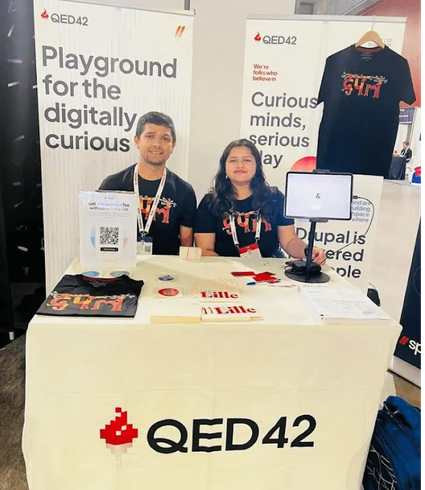
Aastha: I’ve been more involved in local events like DrupalCamp Pune, and one major difference I notice is in the audience profile. In Pune, our community is quite diverse, encompassing not just active Drupal contributors but also people from large corporations, like TCS or Capgemini, who use Drupal in their work but aren’t directly connected to the community. We also have students and newcomers interested in learning about Drupal, so our focus extends beyond core contributors to include raising Drupal’s brand awareness and reaching out to other communities.
For example, we collaborated with PHP Camp Pune, which included Laravel, WordPress, and other PHP communities. This allowed us to connect with attendees from these groups and invite some to our Drupal events. By engaging with other communities, we’re creating a broader base for Drupal in India.
In events like DrupalCon, however, the community is much more structured and established. Contributors there often have over 10 to 15 years of experience, so the focus is on advanced topics rather than introductory content. They have dedicated teams handling logistics, marketing, and planning, making them very well-organized.
As an organizer for local events, I focus on aligning our community’s activities with our mission, which we clarified recently. Our goal is to build a strong local network where people can connect, collaborate, and share knowledge within their own region. Based on these objectives, we design events that appeal to our audience, ensuring a mix of networking opportunities and valuable sessions for both newcomers and experienced Drupal users.
DrupalCon Asia 2024 in Singapore is a highly anticipated event, especially since it’s the first DrupalCon in Asia in many years. What can attendees expect from this event, and how do you plan to make it stand out from previous DrupalCons?
Aastha: This DrupalCon will feature all the usual highlights like sessions, training, and contribution sprints, with the addition of the Splash Awards—a special recognition for outstanding Drupal projects in the Asia-Pacific region. Attendees will also get hands-on experience with the release candidate of Drupal CMS, set to launch on December 9th. We have a dedicated Starshot track, with sessions by initiative leads and community members who are instrumental in shaping Drupal CMS, giving attendees the chance to ask questions and interact directly with them.
To make the event more inclusive, we’re introducing a buddy program, where participants can opt to be paired with an experienced attendee upon signing up, creating a friendly and supportive experience.
"After an eight-year gap, bringing DrupalCon back to Asia is a step toward making these events more accessible to the Asia community, with plans to rotate DrupalCon Asia across regions like Japan and India in the future".
We’ll need strong support from both the community and sponsors to make this a regular fixture. Additionally, social events, including a cycling tour of Singapore, will add a unique local touch, and accessibility features like a wheelchair-friendly venue will ensure every attendee feels included.
You’ve been a part of Drupal for over 7 years now. In your opinion, what makes Drupal unique compared to other CMS platforms, and where do you see the future of Drupal heading?
Aastha: Drupal’s flexibility and versatility allow users to create a wide variety of sites and digital experiences, but what truly sets it apart is the supportive ecosystem and global community that drive it forward. Through initiatives like the Drupal credit system, organizations and individual contributors are acknowledged for their efforts, boosting both individual recognition and company visibility in the marketplace. This level of structure, along with financial support from certified Drupal partners and events like DrupalCon, gives Drupal a foundation many open-source projects lack. Additionally, Drupal’s marketplace lets users find trusted vendors easily, creating a sustainable ecosystem.
Looking ahead, Drupal is moving toward empowering “ambitious site builders” who may not have coding expertise. The community is working on enhancing user experience, integrating AI, and making Drupal more accessible for non-developers. Initiatives to enhance usability for non-technical users, coupled with innovations like AI, are pushing Drupal into a future where it’s not just developer-centric but also user-friendly for site builders. This evolution is backed by a vast and active community, where anyone can contribute ideas and improvements, ensuring Drupal’s continual growth and adaptability.
For individuals who are new to Drupal and aspire to contribute or volunteer in events like DrupalCon or DrupalCamp, what advice would you give them to get started and make a lasting impact?
Aastha: Just show up. Open-source communities are volunteer-driven, so there’s always more work than volunteers. Be consistent, take initiative, and look for ways to get involved, and just enjoy. It’s natural to feel nervous or hesitant at first, but over time, connections will form, and mentors will encourage you to take on bigger responsibilities. For those who feel introverted, I’d say just “do it nervous”—the community is very welcoming, and once you’re in, it’s easier to stay engaged and grow.
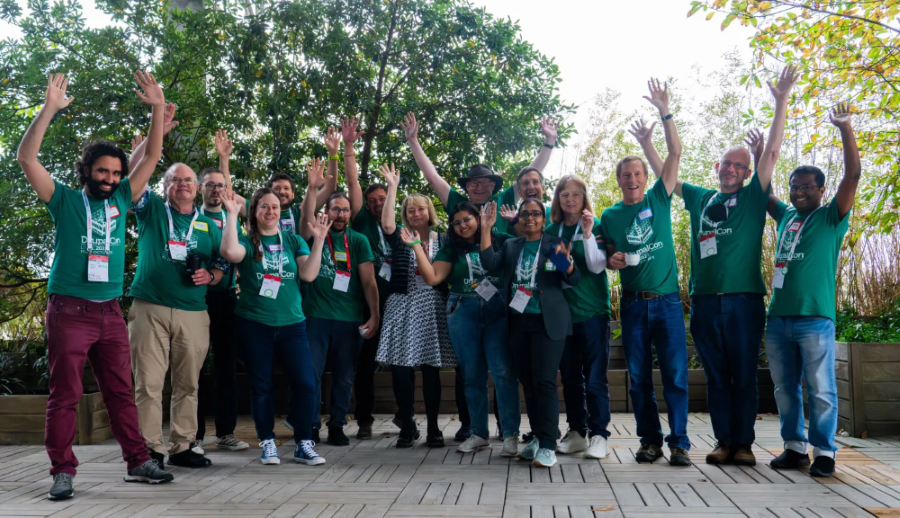
Any final thoughts you want to convey to our audience?
Aastha: Local Drupal communities in Asia have immense growth potential. With the right support from volunteers and organizations, we can expand and engage more people. The goal is to sustain this momentum, continuously improve, and create an ever-evolving, inclusive community that thrives locally and contributes globally.


